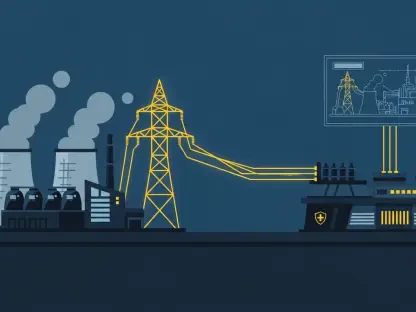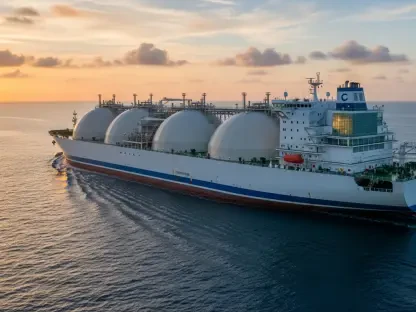A Critical Juncture for Energy Markets
Central Europe’s oil industry stands at a pivotal moment as U.S. sanctions on Russian oil giants Lukoil and Rosneft, implemented late last year, send shockwaves through regional markets. With Hungary and Slovakia heavily reliant on Russian crude, these sanctions—aimed at pressuring Moscow into a ceasefire in Ukraine—have introduced unprecedented uncertainty for refineries and energy security. The stakes are immense, as supply disruptions threaten to spike costs and destabilize economies tied to long-standing energy relationships with Russia. This market analysis examines the current trends, data-driven impacts, and future projections for Central Europe’s oil sector, shedding light on how these sanctions could redefine regional energy landscapes.
Market Trends and Data-Driven Insights
Historical Reliance Meets Modern Challenges
Central Europe’s oil market has long been shaped by a deep dependency on Russian crude, facilitated by Cold War-era infrastructure like the Druzhba pipeline. This conduit still channels significant volumes to refineries in Hungary and Slovakia, with Slovakia’s Slovnaft processing over 4.1 million tons of Russian oil out of a total 4.8 million tons annually. Hungary’s MOL, operating the Danube refinery, handles around 8 million tons yearly, with a substantial portion sourced from Russia. The historical cost advantages of this supply chain are now under threat, as geopolitical tensions and sanctions expose vulnerabilities, pushing markets toward a critical reassessment of energy sourcing strategies.
Immediate Market Reactions to Sanctions
The imposition of U.S. sanctions, effective since November last year, has triggered immediate turbulence in Central Europe’s oil market. Rising oil prices reflect heightened uncertainty, with refineries bracing for potential supply cuts. Logistical bottlenecks are a growing concern, as financial institutions and compliance frameworks hesitate to engage with sanctioned entities, risking delays in crude deliveries. Data points to past disruptions—such as those tied to Ukraine’s restrictions on Lukoil—amplifying fears of operational halts. Market sentiment leans toward caution, with industry players closely monitoring the ripple effects on refining capacities and downstream product availability.
Shifting Supply Dynamics and Adaptation Costs
A notable trend emerging from this crisis is the push toward diversification of oil sources, though the transition is fraught with challenges. With a significant portion of Russian oil production now under sanctions, alternative suppliers are scarce, driving up procurement costs. Comparative analysis of neighboring markets, like the Czech Republic’s gradual shift away from Russian crude, indicates that diversification requires years of investment in pipeline infrastructure and refining technology. For Central European refiners, the short-term financial burden of adapting to non-Russian oil grades could strain profit margins, yet the long-term potential for energy independence offers a compelling market incentive.
Future Projections and Strategic Outlook
Energy Security in a Transforming Landscape
Looking ahead, Central Europe’s oil market is poised for a transformative shift, with projections suggesting a gradual decline in reliance on Russian crude over the next decade. Industry forecasts point to increased capital allocation for alternative pipelines and refining upgrades capable of processing diverse oil types. Regulatory frameworks, potentially including EU-wide policy adjustments, could further accelerate this trend by incentivizing diversification. However, economic pressures from fluctuating oil prices may complicate timelines, requiring refineries to balance immediate operational needs with strategic investments for future stability.
Regional Disparities and Market Fragmentation
Market projections also highlight varying impacts across Central Europe, driven by national energy profiles and political stances. Hungary’s market faces dual pressures of economic dependency and political friction due to its historically pragmatic ties with Russia, while Slovakia’s smaller economy amplifies the relative impact of supply shocks. Analytical models suggest that logistical delays, rather than outright shutdowns, will dominate near-term challenges, though the compatibility of alternative crudes with existing infrastructure remains a wildcard. The fragmented response across the region underscores the need for tailored strategies to mitigate risks and capitalize on emerging opportunities.
Economic Implications and Price Volatility
Another critical projection centers on the economic fallout from these sanctions, with oil price volatility expected to persist through at least the next two years. Market data indicates that input cost increases for refineries could translate into higher fuel prices for consumers, potentially dampening demand in key sectors like transportation and manufacturing. On the flip side, this volatility may spur innovation in energy efficiency and renewable alternatives, reshaping long-term market dynamics. Stakeholders must prepare for a period of economic adjustment, where strategic hedging and diversified sourcing will be paramount to maintaining competitive edges.
Reflecting on the Path Forward
Reflecting on the analysis, it becomes clear that U.S. sanctions on Russian oil have marked a turning point for Central Europe’s energy markets, exposing deep dependencies while catalyzing a push for diversification. The immediate market turbulence, characterized by supply risks and price spikes, has underscored the fragility of historical energy ties. Looking back, the varied regional impacts have highlighted the complexity of crafting unified responses to such geopolitical shocks. Moving forward, refineries and governments need to prioritize cross-border energy partnerships and invest in infrastructure to handle non-Russian crude. Strategic collaboration with EU bodies to secure financial support and policy alignment emerges as a vital step to transform this challenge into a foundation for sustainable energy security.









